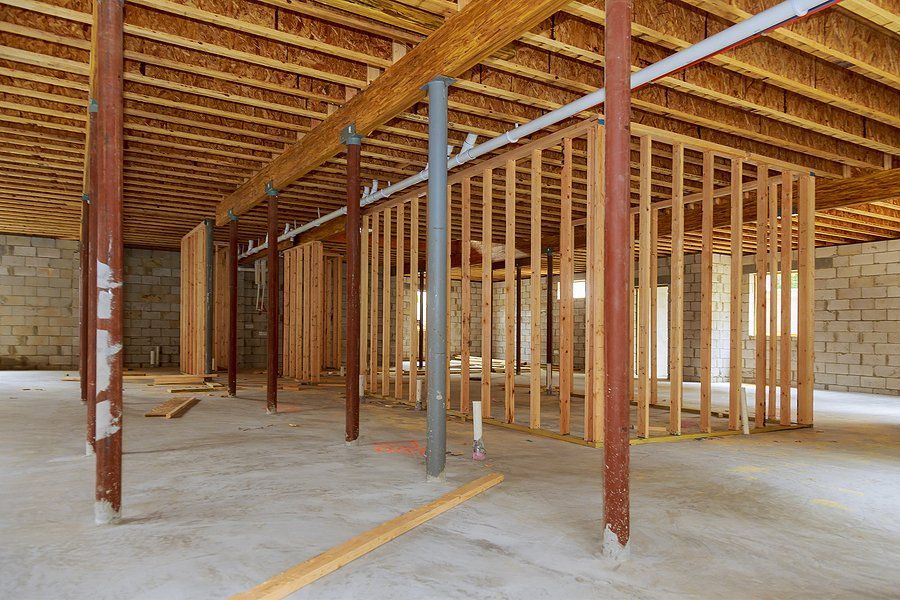Basement Repair Levittown, PA

Understanding Basement Waterproofing
Basement waterproofing is a critical process that prevents water from entering your basement, safeguarding your foundation and the overall structure of your home. With effective basement wall waterproofing and foundation waterproofing, you can protect your property from potential water damage that can lead to costly repairs. Whether it’s basement waterproofing or leaking basement repair, it’s essential to address water-related issues promptly to maintain the integrity of your home.
Signs You Have Water in Your Basement
Spotting signs of water in your basement early can prevent severe damage. Common indicators include:
- Damp or musty odors
- Visible mold or mildew growth
- Water stains or discoloration on the walls or floor
- Cracks in the foundation or walls
- Puddles or pooling water in corners
- Increased humidity or condensation on windows
If you notice any of these signs, it’s crucial to explore basement repair and leaking basement repair solutions to prevent further damage.
Main Causes of Water in Basement
Water in your basement can stem from a variety of causes, including:
- Poor Drainage: Improper water drainage systems around your home can lead to water accumulation near the foundation, seeping into the basement.
- Foundation Cracks: Cracks in the foundation can act as entry points for water, necessitating basement and waterproofing solutions to seal the gaps.
- Improper Grading: The slope of your yard should direct water away from your home. Poor grading can cause water to flow toward the foundation, resulting in basement water issues.
- Heavy Rainfall or Flooding: Extreme weather events can overwhelm drainage systems, allowing water to seep into basements if foundation waterproofing measures are not in place.
Basement Waterproofing Solutions
There are several effective basement waterproofing solutions to address water issues, depending on the severity of the problem:
- Interior Waterproofing: This involves sealing cracks and applying waterproof coatings to interior walls. This solution is effective for minor issues, particularly basement wall waterproofing.
- Exterior Waterproofing: For more severe water problems, exterior foundation waterproofing is essential. This involves excavating around the foundation to apply a waterproof barrier that prevents water from entering the basement.
- Drainage Systems: Installing French drains or sump pumps can effectively manage basement water, directing it away from your home to prevent flooding.
- Crack Sealing: Repairing foundation and wall cracks is crucial for leaking basement repair to stop water from entering through weak points in the structure.
Fixing Basement Leaks
Basement leaks Levittown, PA are a fairly common occurrence in most homes. It doesn't mean that the house itself wasn't built very well, or that some other extraordinary crisis has happened; most likely, though, it's just a combination of natural factors and time, with some man-made variables that can contribute to or aggravate a sinking foundation. Any basement leaks must be dealt with as quickly as possible to prevent worsening the situation and prevent further water damage to the house and possessions. Here are some things you can do to help your basement dry out and settle. But first...
Look for cracks in the walls
Most basement leaks can be traced to either damage to the interior or exterior walls or cracks in the foundation wall itself. If you see evidence of damage, such as holes, cracks in drywall, or signs of moisture infiltration (which can indicate more severe problems), you need to address those problems immediately.

Contact Us
Check for any excess groundwater buildup around the house
This excess groundwater, which can cause stress on foundation walls and contribute to basement leaks, is usually due to poor site location. Groundwater pressure tends to increase along a foundation's length and depth and will build up along a foundation's surface over time. Prolonged hydrostatic pressure also tends to create cracks in the foundation's interior wall. To see if excess groundwater buildup is present, you should consider inspecting around the exterior walls, roof, and exterior foundations (if the house faces an external drainage system).
Examine for other signs of structural damage to the basement wall
Look for fractures in the wall, holes, or missing panels. Look also for gaps between the basement wall and ceiling (if you're inspecting from the inside, you may not notice gaps, but it's easy to notice cracks from the outside). These gaps may serve as entrance points for water that could enter through a crack in the foundation or interior wall. In addition, holes or missing panels are signs of damage to the floor joists themselves - a critical problem if your home is lacking proper basement floor protection.
Look at your HVAC ducts
Ducts that serve as insulation are prone to leaking; especially those that are in close proximity to windows, doors, or even electrical outlets. Look for signs of deterioration around air vents and condensation ducts (you'll be able to tell by the discoloration of the ducts). If you suspect you have basement leaks, you should get an air quality specialist (or an HVAC contractor) out to look at the house to determine the source of the leaks. A qualified professional can find the source of the leak, isolate the problem, and make necessary repairs.
If you have concrete walls, there's a good chance that you have basement leaks
This happens because concrete isn't very adept at handling pressure - a lot of pressure is applied to a wall with concrete walls (which is also the case with most poured concrete floors), and eventually, the concrete begins to weaken and crumble under the weight. This means that water gets behind the weakened area of concrete and slowly seeps in. Most of the time, this water serves as a direct route to the foundation.
Of course, basement leaks can also occur in older wood framing houses. The same thing goes for shoddy wooden wallboard – wood framing tends to break down more slowly than poured concrete, so small cracks often go unnoticed until they become larger and occupy a larger space. To prevent further damage, homeowners should consider using basement waterproofing paint, which can help seal these small cracks and provide an additional layer of protection against moisture seeping through the walls.
You can fix most of these small foundation crack problems yourself, with some minor help from a contractor (a pro will know which methods are best for your specific situation), or you can hire someone to come in and take a look. Keep in mind that this won't usually fix the underlying cause of your basement leaks - you need to figure out why your foundation is leaking, and then fix that (although sometimes you can simply relocate a piece of hardware). A good basement contractor should be able to give you a full report on any basement leaks they find, as well as tell you how much it's going to cost to fix them. Make sure you get a written estimate, so you'll have something to compare with.
When you have basement leaks, the most common area to start is with the roof. If you have condensation built up on your house, or if the roof is leaking, that moisture is probably causing the leak. Check around the attic, especially in the areas between the ceilings and the walls - any moisture behind or around your house walls is going to cause a basement leak. In addition, check the valleys between the roofs and walls - these are also likely places to carry excess moisture. You may need to add a sealant to these areas to stop excess moisture from getting underneath the house and into your basement.
Expand your expertise with our regularly
updated blog, where industry professionals share their latest insights.
How can I prevent water from entering my basement?
To prevent water from entering, invest in basement waterproofing systems, ensure proper grading around your home, and keep your gutters clean to direct water away from the foundation.
What’s the difference between interior and exterior waterproofing?
Interior waterproofing involves treating the inside of your basement, such as sealing cracks and applying water-resistant coatings. Exterior waterproofing requires excavating the outside of the foundation and applying a waterproof membrane to prevent water from entering the structure.
How do I know if my foundation needs waterproofing?
If you notice cracks in your foundation, persistent moisture, or signs of basement water, it’s time to consult a professional for foundation waterproofing solutions.
Can I handle basement waterproofing myself?
Minor cracks or leaks may be manageable for DIY solutions, but for significant issues like a leaking basement repair or basement repair, it’s best to consult professionals who specialize in basement and waterproofing.

